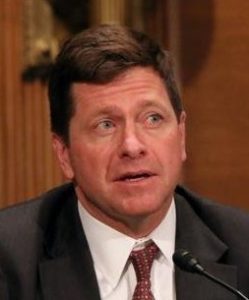
The implementation of a new best interest standard for broker/dealers is necessary, the Chairman of the Securities and Exchange Commission (SEC) stated.
“I don’t think there’s any doubt in anyone’s mind that action in this area is necessary,” SEC Chair Jay Clayton said in response to a question about this new standard.
The new best interest standard was proposed by the SEC last week.
“Under proposed Regulation Best Interest, a broker-dealer would be required to act in the best interest of a retail customer when making a recommendation of any securities transaction or investment strategy involving securities to a retail customer. Regulation Best Interest is designed to make it clear that a broker-dealer may not put its financial interests ahead of the interests of a retail customer in making recommendations.” The SEC stated in a press release last week in announcing the rule.
The Fiduciary rule, which held that anyone advising on retirement accounts needed to act as a fiduciary, was controversial from the start and in March a Federal judge ruled that the rule was unconstitutional.
Since then, the rule, which was being implemented by the Department of Labor, has been in limbo.
The SEC made this proposal as an alternative.
Clayton made the comments in a hearing in front of the House Appropriations Committee sub-committee on Financial Services and General Government.
Clayton was testifying in front of the committee in support of a Fiscal Year 2019- which starts in October 2018- budget request of $1.652 billion.
“With a workforce of over 4,500 staff in Washington and across our 11 regional offices, the SEC oversees, among other things (1) approximately $82 trillion in securities trading annually on U.S. equity markets; (2) the disclosures of approximately 4,300 exchange-listed public companies with an approximate aggregate market capitalization of $30 trillion; and (3) the activities of over 26,000 registered entities and self-regulatory organizations. These registered entities include, among others, investment advisers, broker-dealers, transfer agents, securities exchanges, clearing agencies, mutual funds and exchange-traded funds (ETFs) and employ over one million people in the United States.” Clayton stated in his written opening statement.
The SEC, when it announced this new proposal, said that investment advisors were still governed by the fiduciary standard, but Clayton indicated there is going to be little difference.
“I think we all also agree that that relationship (between the broker/dealer and their client) should be governed by fiduciary principles. We’ve called it the best interest standards, but I want to be clear, for broker dealers, there are fiduciary principles embodied in the best interest standard.”
Indeed, it’s hard to tell the difference between a best interest standard and a fiduciary standard because a fiduciary, according to a legal definition, is “required to act in the best interest of the principal, the party whose assets they are managing.”
Clayton maintained that there is a difference between an investment advisor’s fiduciary standard and the best interest standard of the broker dealer, but his testimony only brought more confusion as to the difference.
The rule has only been proposed. Currently, it is going through a ninety-day period where the public is free to comment.
Clayton also said he would do roundtable discussions of the proposed rules in several cities around the country; currently, roundtables are scheduled in Atlanta, Georgia, Denver, Colorado, Miami, Florida, and Houston, Texas.
The difference between these two standards will hopefully become more clear as this process goes along.








